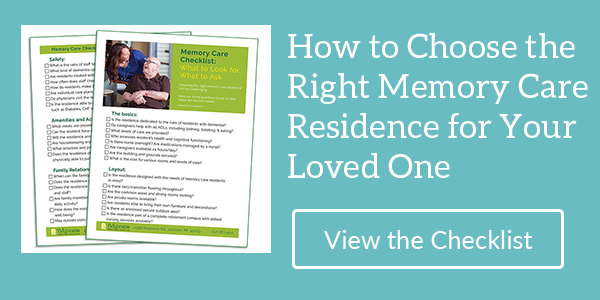One of the most frustrating and painful parts of aging is the effect it has on your memory. Being unable to recall priceless, happy times with your loved ones or finding yourself struggling with formerly easy, mundane tasks can be difficult – both for you and your family.
Want to stave off memory issues and keep your mind sharp for as long as possible? Here are some activities that can help. Enlist someone you love to assist, and try to do at least 2-3 daily for best results.
Do puzzles of any kind.
Puzzles are a great way to stimulate your cognitive skills and keep your analytical and reasoning abilities top-notch. Try to vary the types of puzzles you do every time. One day, do a physical, cardboard puzzle, and another try a Sudoku or Crossword. You want a good mix of numbers, words and physicality involved to really spark brain activity.
Play a game.
Games are a great way to delay memory loss – particularly games you’ve played since you were young. Try a card game like Go Fish, Hearts or even Solitaire, or opt for chess if you’re really looking for a brain workout. If you can make the game a social activity, with friends or family members, that’s even better for your mental health.
Stimulate the senses.
Smell and touch are often the senses most tied to memory, so try and stimulate these daily with a new experience. Light a new candle, play music you’ve never heard before, touch a soft blanket or taste a new flavor. Not only will these activities heighten your awareness of your surroundings, but they’ll also stimulate your sense memory as well.
Memorize something.
Make a small list – grocery items you need, the types of flowers you want to put in your garden or maybe even a few lines of a new song you just heard. Read it over and try to memorize it. In about 30 minutes, sit down and try to recall the entire list. Write down what you remember and compare the two. If you get all of them right, next time make the list one or two items long to up the challenge.
Learn a new language.
There are few activities as cognitively stimulating as learning a foreign language. Even just listening to a new language activates parts of the brain you don’t use daily and can reduce your overall risk of cognitive decline. Enlist a friend with foreign language skills to guide you, or try an audio program like Rosetta Stone. Either way, you’ll get serious benefits from the experience.
Bake a cake.
There are a lot of moving parts when it comes to baking a cake. You have to use math skills in measuring and adding the ingredients, physical skills in mixing, kneading, icing and decorating, and finally, sensory skills to taste the final product. If you’re not big on sweets, you can try a cooking a meal or snack instead. Either recall a favorite recipe from memory or try a new cuisine and send that taste sense into overdrive.
Try a new fine-motor activity.
Take up a new hobby that requires solid hand-eye coordination. Painting, knitting, drawing or even writing are all great options, especially if they’re activities you’re not well-versed in. Introducing new physical skills is a great way to stimulate your brain and keep it sharp.
Take up a new sport.
Even better than a fine-motor activity is a new, full-scale sport. It doesn’t have to be highly physical, but introducing a competitive, score-keeping aspect can be a solid way to exercise both your mind and body at the same time. Good options include golf, tennis, ping pong or racquetball.
Use technology.
There are some interesting apps and technologies that can make sharpening your brain both fun and easy. Lumosity is one of the most popular and can be played right on your phone. NeuroNation, Elevate and Fit Brains are good ones, too. Ask a friend or caregiver if you need help getting set up.
Read, read, read.
It doesn’t have to be a full book or even a short story, but try to read at least something every single day. It can be lyrics to a song, a poem, an article in the newspaper or even a letter from your grandson. Reading keeps your verbal and cognitive skills sharp, while also activating your sight senses.
Name that tune.
Ask a friend or loved one to play you a few bars of a song, and have you guess them. Who’s the singer? What’s the name of the song? When was it released? It takes a little set-up, but it can be a great way to test your long-term memory – with song details, lyrics and even the nostalgic moments tied to those songs. You can even make it competitive by enlisting other contestants to play along with you.
Keep a daily journal.
Journaling is extremely helpful in strengthening memory skills. Try to write in your journal every night, before going to bed. Jot down what you did throughout the day, how things made you feel and what you plan to do tomorrow. Add in as much detail as possible, even breaking your day down by hour if you can. Put the journal on your nightstand to make doubly sure you remember each night.
Keep Your Memory Intact
Memory loss is easily one of the most painful parts of aging, but it doesn’t have to be. Use these activities to keep your mind sharp, and consider a quality memory care center if memories start to fade. With early intervention and the right daily care, you can ensure a strong, healthy mind for many years to come.
If you want to plan ahead for memory care options, our “Memory Loss and Memory Care Guide” can help with the decision making process. Want to safeguard your memory or ease the effects of dementia or Alzheimer’s for someone you love? Stop by Ganton’s Brightside Assisted Living & Memory Care facility today or call Margaret Nagel at (517) 206-5000 or download our brochure to learn about our care levels, cost, and amenities.


